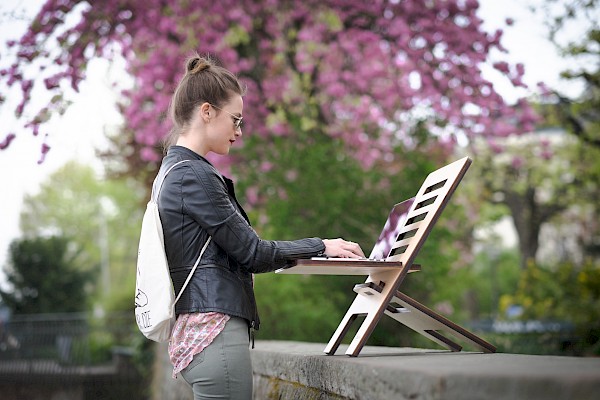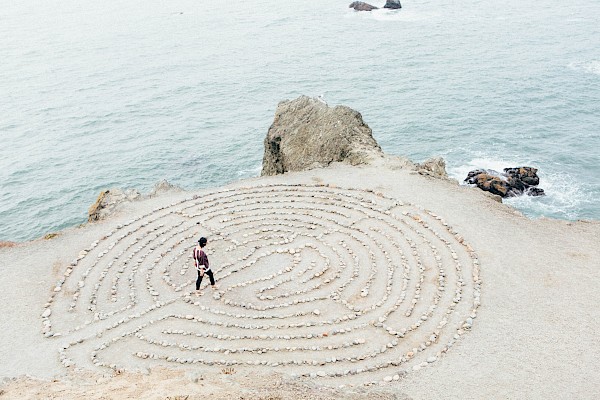Mindful working
The Covid 19 pandemic drastically changed our lives and how we work. In spring 2020, the Federal Office of Health was advising us all to “stay at home!” Consequently, many businesses sent their employees to work in the comfort of their own homes, where they faced multiple new challenges.
Did this huge change affect you too? Did you suddenly have to sit down at your living room table with your work laptop, take care of the children in between online meetings, look after the household in your breaks and go shopping for people at high risk after work? Do you remember this crazy time? How were you, back then? Was it easy for you to make the change? Or were you never affected by the recommendation or obligation to work from home and could go to work as before? Either way, various studies show that mindfulness at work is good for staff wellbeing, mental health and performance.
Particularly right now, given that many of us are returning to our place of work now that the federal government is no longer requiring us to work from home, it’s worth learning more about mindfulness at work. Because returning to the office after a year of working at home has just as many associated challenges as switching from your workplace to your living room. And if the term “mindfulness” makes you think of a yogi with a matcha tea, then we recommend you read on, because “mindfulness” is about much more than just “feeling good”.
Mindfulness
The literature describes mindfulness as awareness of and the ability to focus on what is happening in the present moment (e.g., thoughts, physical sensations, surroundings) without judging. In other words: mindfulness allows you to observe what is happening in the present moment – both within yourself and in your immediate surroundings – without attaching any interpretations to what you perceive. So mindful observation simply means seeing what is happening in the here and now, without being judgemental about it in any way. Consequently, mindfulness results in an increased ability to be objective about your internal and external experiences, and enables you to separate yourself from your thoughts and feelings so you can simply observe them instead. As a result, you experience many things as less stressful, which means you also feel less tense.
How often have you simply experienced yourself and your surroundings without interpreting and judging your perceptions? How often have your thoughts jumped around from one subject to the next, instead of being present in the here and now? Have you ever sat n a meeting and mentally prepared yourself for the next meeting? Or written your shopping list for this evening on a mental post-it before your mind’s eye? All this is entirely normal, because there are so many demands on our attention in this day and age, and mindfulness is something that has to be learned.
“We all run but we never arrive. We run through the day. We run in our jobs. We run into the wall.”
- Max Herre -
Because work has become more intensive and we are overloaded daily by information from the media and other communication channels, many people today instinctively believe that they need to manage several tasks in parallel. As a result, they feel harassed and overworked, and frequently that they are trapped in a “hamster wheel”. Only multitasking helps most people in such a situation. Yet what we call multitasking actually means constant interruption for our brains – jumping backwards and forwards between topics and tasks. Contrary to what many people would like, this is highly inefficient and triggers our bodies into releasing stress hormones that make us tired, resulting in a loss of concentration. Consequently you feel exhausted at the end of the day, you are no longer on the ball and you wonder where the day has gone and what you’ve been doing the entire time.
Scientific studies show that after only half an hour of multitasking with different media such as the internet, video conferences or emails, the ability to concentrate or filter information drops substantially. As a result, it’s not just our performance that suffers long-term; our health does too. We can improve our self-management abilities in order to handle digital media more healthily: learn to press the pause button when you need to and so boost your concentration.
Slowing down your working life with mindfulness
Although mindfulness can be practised using many different techniques (e.g., breathing techniques, meditation), you don’t need to use any particular technique to cultivate mindfulness in your daily life. You can pursue your daily activities and still be mindful, provided you consciously focus your attention on the present moment without any prejudice. The key to being mindful while you are doing something is to remember to remain attentive to and conscious of what is happening in the here and now, every moment.
A mindful moment occurs when you make use of something available to all of us: your awareness. You can use your awareness to experience the present moment without judging and without thinking of the past or the future. That is how alternatives are created: you can approach challenges systematically and waste less time with your thoughts running round in circles.
Particularly at work, it is worth stopping for an instant and experiencing what is in the here and now, despite the hustle and bustle and pressure of deadlines. Now we will tell you how this works!
Ideas for more mindfulness at work
#Start the day slowly
Instead of checking your emails and the news first thing in the morning, rushing into the office and then straight to the first meeting, approach your day peacefully. Leave the news and your emails alone until you have arrived at work. Prepare for your working day only when you are there, have a cup of tea or coffee ready, open the windows and take a few deep breaths. Now prepare yourself by becoming aware of your focus and your priorities. This is how to start your full working day and still remain relaxed, and this peaceful start will give you greater strength over the next few hours.
#Stop autopilot on time
We all come under pressure sometimes. Maybe it’s criticism from your line management, additional tasks, new deadlines or an absence from your team that sends your blood pressure sky-rocketing. Work, like life, often does not run according to plan. Remember: your body is an excellent stress detector. Are you suddenly warm? Is your breathing shallow? Is your heart racing? There you are: there can be no clearer signals that you need to stop and savour the space between stimulus and response. Be aware of what is really putting you under pressure at this precise moment and try to experience the world around you objectively. We often react at the emotional level without first checking the facts. And yes, sometimes there just aren’t enough hours in the day to get all the work done. And in some situations, it’s hard not to take comments from your boss or colleagues personally. Regardless of what triggers your stress responses in such moments, you’ve got this. Stop. Breathe. Be aware of what is going on right here, right now. And then act.
#Communicate mindfully with others
On some days, everything runs like clockwork, and on others, people in the team talk at cross-purposes, misunderstandings arise, people have differing opinions or come into conflict personally. In such situations, only one thing can help: listening and showing understanding. Put yourself into the other person’s shoes before being drawn into the spiral of passive-aggression or interrupting each other. Ask yourself: what could lie behind the other person’s behaviour; what fears, longings or worries could be driving them? Even though we generally see our colleagues every day, or we are at least in daily online contact with them, we can never know what exactly is going on in their lives. Be aware of this and try to listen actively and communicate mindfully.
#See what is there
Or smell, hear, feel or taste – your senses will help you to experience the present moment consciously. Pay attention to a single sensory perception; you can change which one over the course of the day. Listen to, for example, natural sounds on the way to work, consciously taste the aroma of your coffee during your coffee-break or enjoy the intense scent of the air when you finish work on a hot summer day.
#Take regular breaks
An over-active brain is less productive. Relax your brain with regular breaks and recharge your batteries for the coming tasks. Micro-breaks of a few minutes are enough to allow you to work on with your focus restored. You can find more tips on taking breaks here.
Breathing exercises can also help you to be more mindful during the day. You can find more breathing techniques in our article “Breathing – coming up for air”. There is also more on this subject and what’s available in Zug Canton on our website under “Mindfulness”.
“Mindfulness means that you don’t look away, don’t argue things away, don’t talk things away, but just allow what is to be.”
- Paul van Tongeren -
References:
Madore, K. P., Khazenzon, A. M., Backes, C. W., Jiang, J., Uncapher, M. R., Norcia, A. M., & Wagner, A. D. (2020). Memory failure predicted by attention lapsing and media multitasking. Nature, 587(7832), 87–91.
Koroll, C. Warum Achtsamkeit in der Arbeitswelt so wichtig ist wie noch nie. Blog article. Available on: https://www.7mind.de/magazin/achtsamkeit-arbeit-job-praevention-tipps-alltag
Toniolo-Barrios, M., & Pitt, L. (2021). Mindfulness and the challenges of working from home in times of crisis. Business horizons, 64(2), 189–197.
 subscribe to newsletter
subscribe to newsletter


